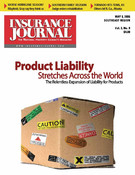Basic insurance coverage salespersons don’t fully understand their products or completed operation exposure, and if agents don’t understand it, public understanding is even more limited. Insurance companies are just beginning to address this topic, one that has been an ongoing issue for me for 32 years.
A very frustrated young woman called the other day. She had been calling insurance agencies to get a quote on her “Juice Bar.” She and her husband attend fairs and rallies and set up a stand for fun and profit. It sounds innocent, but by the time she got to me she was ready to bite off someone’s head.
She said a fair operator wanted to be named as an “additional insured” on her policy and was asking for $1 million general liability and $1 million in products liability.
“No problem,” I said, “we sell these kinds of coverage all the time. There is a $1,000 minimum premium. When would be convenient for you to come in and sign the paperwork?”
At that moment, it all started going wrong.
“What’s the matter with insurance agents? This is a pre-packaged fruit drink. All we do is cool it and sell it to the customers,” she said. “We have no liability–the manufacturer does!”
I honestly don’t know if this woman called to buy a policy, fight with me, or see if someone would give her a policy for $100. Probably, by the time she got to me, it was a little of all three.
“I’m sorry, Mrs. Jones, I would be glad to explain the details to you in person,” I said. “Would Tuesday be good?”
Click. She hung up on me.
I don’t blame this woman for being upset. I don’t blame the fair operator for wanting the “additional insured” endorsement. I do not blame the company for charging $1,000 minimum premium. I do not blame myself for getting aggravated with the client. So, what is the problem here?
The insurance industry cannot give her the coverage for $100 and she and her husband either cannot or do not want to pay $1,000. It’s that simple.
I don’t know what that lady and her husband finally did.
Maybe they found the coverage for a lesser premium. Maybe they quit the business. I really don’t know what happened to her. The truth is, I care about it or I would not be writing about it. I do not have a carrier that provides what she needs for less than what I quoted. I have seen this happen in many different industries.
Product component key
One of the key coverage parts of a vendor policy is the products component.
She was quite descriptive of what sounded like a fantastic fruit drink. It was a little exotic for my taste, but sounded interesting. It had some fruits and juices and sounded like the tropics would be in your mouth on a hot day. But honestly, it also sounded like it could cause anaphylactic shock to a young unsuspecting child who might be allergic. I believe that any act of selling food to the public comes with a high amount of responsibility.
Yes, the manufacturer has liability. But so does the vendor. And my potential client did not want to talk about it, much less recognize or admit it.
When you sell a product to someone, even if someone else manufactured it, you are the front line, responsible person when that product causes injury or harm to someone–whether you want to recognize it or not.
Beside the high premium being a turn-off, this lady had already decided before she called me that she and husband had no liability for selling a pre-packaged drink.
I am sorry Mrs. Jones, your front end liability does not go away because you wish it to go away. You have a product liability exposure to all kinds of problems. Choking, allergic reaction, cutting a finger, dying, becoming sick–the list is long. Will it happen? I believe in Murphy’s Law. If it can, it will.
Mrs. Jones is not the only client for whom this issue is disturbing. She did not have to go to school to become a “Juice Bar” owner. All she had to do was become one. I am not even sure there was a license required.
In “Jurassic Park,” the mathematician said to the park owner, something to the effect of “you did not create this park having the discipline to do so, you stood on the shoulders of others who did and just did it because you could–not ever thinking if it was right or not.” After that the dinosaurs ate the people.
Many businesses today take the same approach as Jurassic Park–build it and they will come! Many people want to own and manage the business as absentee owners. There is a desire for minimal liability and maximum profit. Many workers also want temporary-type jobs with permanent benefits.
Insurers are recognizing this trend. Temps such as “day workers” are not covered under a general liability policy because essentially they are not knowledgeable.
I just read a surplus lines contracting policy endorsement for a well known company that excludes work on a master condominium, tract housing, homeowner association or a housing development. This is all about the product and completed operation exposure.
Contractors who say they are a “handyman” better be a “handyman,” not a tract housing installer. Or no claim will be paid.
The juice bar is a simple example.
You cannot sell the proper products coverage to someone who does not want to recognize that they have liability. Products liability is essential to risk identification and it is Insurance 101.
In this electronic data era, you can access tremendous information. Be an informed agent! Good selling!
Ron Silverman is an independent agent and owner of Ronald N. Silverman Insurance Agency Inc. in Deltona, Fla. He is a trainer and consultant to the Professional Insurance Agents of Florida.
Topics Agencies
Was this article valuable?
Here are more articles you may enjoy.


 Beazley Agrees to Zurich’s Sweetened £8 Billion Takeover Bid
Beazley Agrees to Zurich’s Sweetened £8 Billion Takeover Bid  MAPFRE Denied Injunction Against AAA Auto Insurance Sales in Massachusetts
MAPFRE Denied Injunction Against AAA Auto Insurance Sales in Massachusetts  Maine Plane Crash Victims Worked for Luxury Travel Startup Led by Texas Lawyer
Maine Plane Crash Victims Worked for Luxury Travel Startup Led by Texas Lawyer  Chubb CEO Greenberg on Personal Insurance Affordability and Data Centers
Chubb CEO Greenberg on Personal Insurance Affordability and Data Centers 


